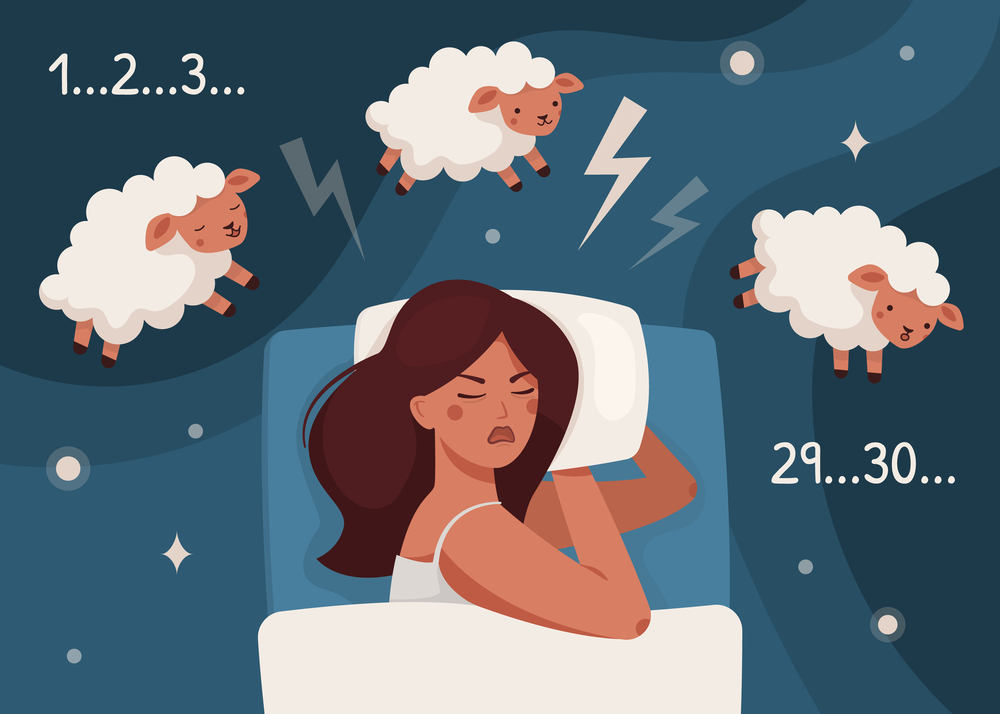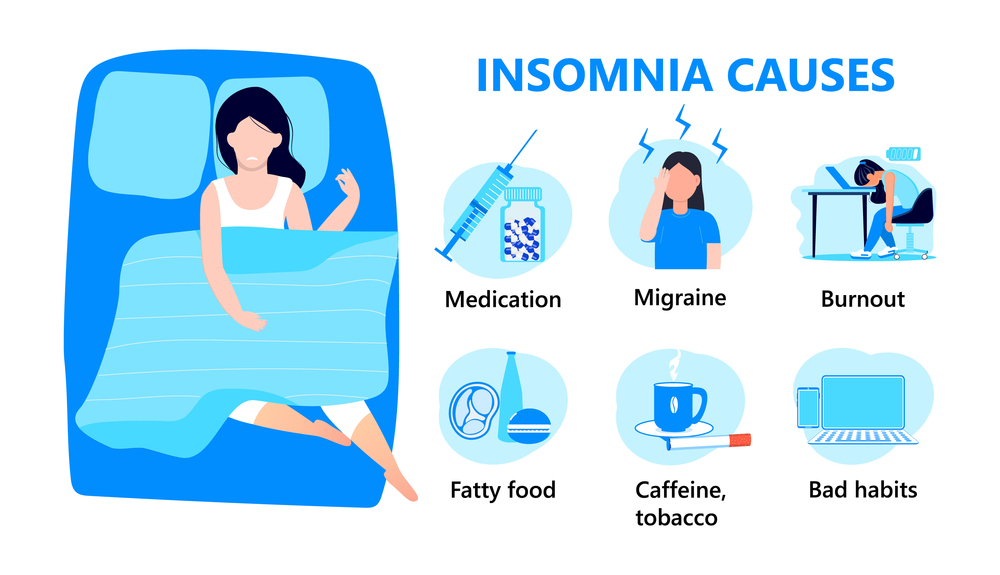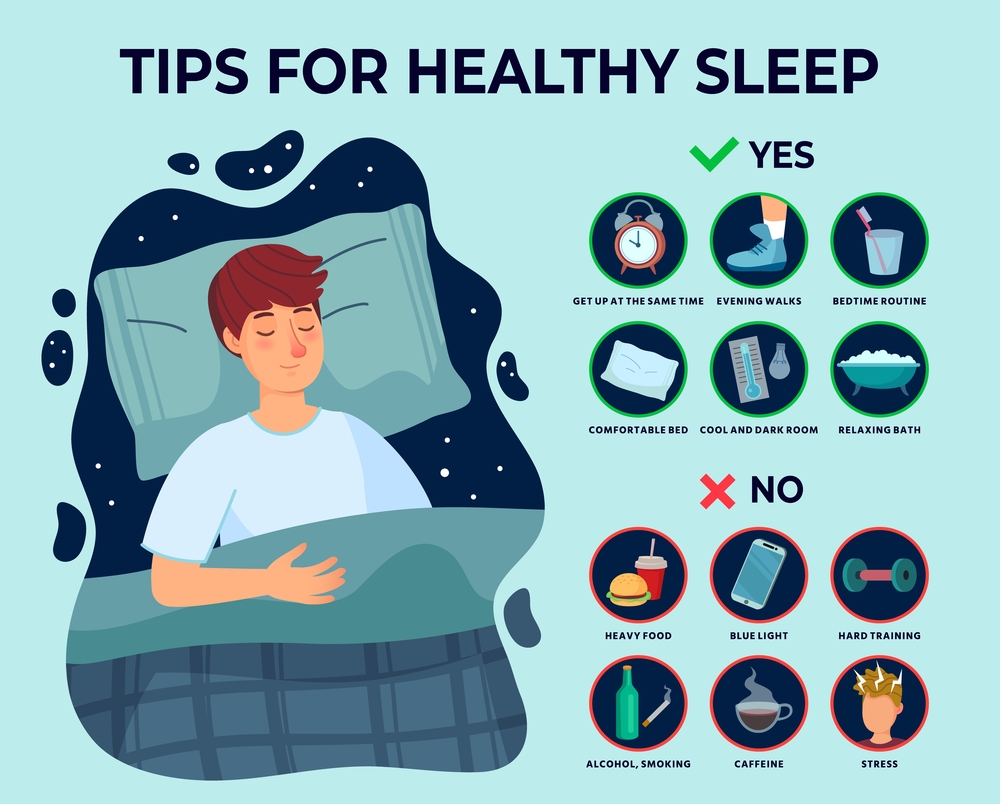
Everyone experiences periods when they may not sleep as well as they used to. It could be situational, a stressful job or relationship, grief, or financial worries. As much as we would like to “shut it all down” at night so we can get our shut-eye, it’s not as easy as it sounds. Sleep Indica? Is that actually a thing?
Chronic insomnia is frequently associated with an underlying medical condition. Either a physical symptom of a disease or a mental health disorder. Or both. According to one of America’s leading resources on sleep disorders, you may have chronic insomnia if you have three or more nights of poor sleep per week for three months.
How do you know if you have a problem with chronic insomnia that requires some medical help? One of the ways you can tell is by modifying your sleep habits. If you make changes to create healthier sleep patterns, and it works? It’s not chronic insomnia. But consult with a certified care provider before you try to address the symptoms.
There are six typical causes of sleep disruption that aren’t related to a specific chronic disease diagnosis. The situational (short-term) contributors to insomnia are:
Some causes of sleep deprivation, however, are not circumstantial or transient. That is when chronic insomnia becomes a health risk. And the reasons are usually tied to a diagnosable health condition.
Chronic insomnia can be caused by:
People often think that sleep deprivation isn’t a severe health risk. We now know that it is. And so, talking to a medical professional about it (sooner than later) is a good idea. There are many approaches to treating chronic insomnia. And one of them is medical marijuana.

A little sleep loss won’t hurt you, right? After all, you can sleep in (maybe) on the weekend and catch up. That’s something we all tell ourselves when we haven’t done an excellent job of maintaining a healthy sleep pattern. But ‘catching up’ on your sleep doesn’t undo the harm that insomnia can do to your body.
There is more education and awareness now than ever before about the health risks of chronic insomnia. Did you know that the American Sleep Association released a recent report that more than 70 million Americans have a sleep disorder? And insomnia is at the top of the list, impacting 30% of adults in the United States.
But when it comes to chronic insomnia, a severe health problem, only 10% of Americans have been diagnosed. That is still over 700,000 Americans who are functioning daily with little to no sleep. It is not only dangerous to their health and well-being, but it can be a safety risk to others.
When you don’t get enough sleep, you can experience the following impairments or health risks:
Your body counts on you getting the REM deep sleep. Think about it as a time when your brain runs a full bumper-to-bumper diagnostic check. And it fixes things. So that downtime is critical to your immune system.
When your body is fighting off a virus or bacterial infection, it needs tiny proteins called cytokines. The advanced technology of the human immune system is unreal. The cytokines are also responsible for putting you to sleep. So that you can rest, conserve energy, and let the powerful proteins attack whatever threat is invading your body.
The problem is that when you don’t get enough sleep, you produce less of them. Which means it gets harder to get to sleep too. And, you’ll be more prone to getting viral and bacterial infections. If you feel like you are getting every cold bug that goes around, it’s a good idea to talk to a provider.
Are you someone that gets about five (5) hours of sleep per night? You may joke that it is plenty of rest for you. After all, you are used to it. But if you have been rocking less than seven hours of sleep for most of your adult life, it’s time for an intervention because your body is taking it to heart, literally.
Durations of less than five hours per night are a big problem. But what if you sleep too much? You probably wouldn’t be reading this article. But people who sleep nine (9) hours per night or more also experience cardiovascular problems. At higher rates statistically than people who get about 6-7 hours of sleep every night.
Your chance of developing coronary heart disease or having a heart attack or stroke exponentially increases if you have unaddressed chronic insomnia.
Well, isn’t that good news? According to some clinical studies, short sleep durations over long periods can increase your risk of developing certain types of cancer; breast, colorectal, and prostate.
People who work off-shift or overnight are most at risk. But women and men who slept at least seven (7) hours or more per evening had the lowest risk and highest longevity rate.
Now that we’ve got your attention, you are probably wondering what insomnia has to do with having (and sustaining) a healthy sex drive. One clinical study published in JAMA estimated that libido could be reduced by more than 15% if the individual has chronic insomnia. And for men? It can significantly lower testosterone levels.
Cognition means the ability to be able to remember details, both with short-term and long-term memory. But when you deprive your body of sleep, your brain starts to stretch those scant energy resources. And that means remembering things could be like retrieving a file from a ten-year-old laptop. It’s in there, but it could take a long-time to recover it.
The most popular strains of medical cannabis sold are usually a Sativa hybrid. Or a straight Sativa dominant cannabis. The reason is that Sativa’s are known to create a happy, euphoric and positive state of mind. And many of them can be highly effective for pain relief as well without grogginess.
During the day, you don’t want to feel so relaxed that you are sleepy. Your boss will notice if you start snoring on the Zoom call, right?
But Indica’s are commonly chosen for nighttime use. Workday is done, and dinner and dishes, now it’s time to hit the couch and hit the bong and ‘check out.’ The sedative effects of Indica cannabis vary according to potency. The higher the potency? The more probable it is that you will end up ‘couch locked’ if you are not an experienced Indica user.
That’s when you wake up at 3 a.m. with your dog licking your face in the living room. Some people make the mistake of trying a heavy-hitting high potency Indica right out of the gate. Most budtenders (and they are the experts) suggest starting low-potency and working your way up until you find the right one for your needs.
The first step is to talk to your primary care physician (PCP) if you are currently taking prescription medications. That’s why the medical card health evaluation is so critical! Part of the annual review is to look at the medicines you are taking to ensure that cannabis is a safe option.
The answer is “it depends” because there are a number of factors that could increase the risks of combining Indica cannabis with prescription pain medications.
The hard and fast rule is that, like alcohol, many prescriptions may not mix or mesh well with cannabis. That’s a conversation to have at your next doctor’s appointment. Because cannabis affects different receptors than traditional pain medications, it may be an effective treatment strategy. Particularly for people who are concerned about the side effects and potential for addiction to prescription sleep aids.

If you have seen (or smoked) one Indica, you’ve smoked them all? Not even close! While Indica strains all share the common sedative nature, some strains have terpenes to help you get better sleep. So, pay attention to the terps too!
Some of the best strains of Indica that may help you improve your sleep include:
After you have checked with your physician, head to your local medical cannabis dispensary. Explain that you are looking for an Indica that can help you improve your sleep. Insomnia is both mental health and physiological risk to your well-being.
Indica cannabis strains vary widely. And there are different methods you can try, depending on the state where you live. Some people prefer to take an edible about one hour before bed. While others prefer a couple of drops of an Indica and CBD (for inflammation) tincture.
Featured IMage: Deposit Photos
No Information on MarijuanaDoctors.Com should be used to diagnose, treat, prevent or cure any disease or condition. You can view our Full Disclaimer here.